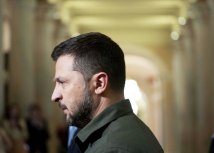Against conspiracy of silence
Not a single murder of journalists in the past 20 years has been solved in Serbia and as time goes by it will be even harder to discover murderers and those who ordered the murders. If it stays that way, Serbia will still be a country in which it is possible to kill journalists and go unpunished.
Veran MatićWe must not let that happen. The system’s institutions have had enough time to solve these murders. This has not been done and it was logical to make a step forward, meaning to get journalists themselves to be more active. The commission on murder of journalists was therefore created at the journalists’ request.
As soon as the commission was established, (Serbian Renewal Movement leader) Vuk Drašković released, without a single argument, that the commission was a cover for the release of Rade Marković, a former State Security Service chief, who was sentenced to 40 years in prison. Drašković has been running a campaign against the commission since then as a part of some vendetta that other individuals or organizations join occasionally and their goal should be exactly what the commission is doing, and that is to determine the full truth about the murders and make reasons why it has not been done so far available to the public, to identify and punish the perpetrators and those who gave orders.
Therefore, a conspiracy of silence has existed for years in the system’s institutions regarding these cases and when an initiative appears that could make some step forward, we can hear that even the conspiracy of silence is better than the whole thing taking a direction someone would not like.
The commission gives an opportunity to make progress in the investigation because it has a mandate to determine what has been done so far and why perpetrators have not been discovered and inform the public about it, but also all competent authorities that have never sat at the same table with the same goal in mind before and have never had all the information from various services and judicial organs. Everybody is doing their job and they are not overstepping their mandate and data are exchanged which gives both investigators and prosecutors new material to work on.
In the case of Dada Vujasinović’s murder, if there had not been for the commission, the lost evidence that have not been available since 1999 never would have been found and the super-expertise by the most relevant world ballistics and forensic medicine experts never would have been organized.
In the case of Milan Pantić, a rather wide investigation has been opened to investigate new indications and evidence, testimonies and directions that have not been covered by the investigation before, or at least not enough.
By investigating all the activities of investigative organs and other institutions in Slavko Ćuruvija’s case, the commission discovered that there are possible witnesses that have not been covered by the investigation so far or they did not testify about their knowledge or about what they saw because they were afraid for their lives and lives of their family members and that they were not offered protection from those who had a real power in the state or that it happened in some turning points of changes of the authorities so it was not clear who really had the power.
The commission also discovered that there are possible witnesses who participated in the organizing of the crimes that are believed that they could testify about the entire chain – from those who gave orders to perpetrators with whom nobody has negotiated so far for various reasons.
When the commission released its first report, the following sentence reopened sharp rhetoric against the commission:
“Names of all those who can help with their testimonies, either as protected witnesses or witnesses who did not participate in the events and who need protection because there is a possibility that they know facts that could be relevant for the identification of murderers have been taken down. The commission is ready to propose the Organized Crime Prosecution to launch a process to offer protection to these persons if they present key information that would lead to the identification of the killers and those who gave them orders and a successful court epilogue. To determine the truth and responsibility for the crime represent a priority in the commission’s work and it is necessary to use all legal means to get convictions”.
It is very clear whom this stance refers to and that there is no intention of taking over jurisdiction from the competent institutions.
If the state is “suspected” of some crimes because its institutions are directly connected with those crimes, it is legitimate to use all legal means to individualize the criminal responsibility. Serbia cannot accept that someone committed war crimes and killed journalists on its behalf because nobody has ever gotten such a mandate from the people. This is why the state has an obligation to determine the full truth about all the crimes.
This article was originally published in the Belgrade-based weekly NIN



